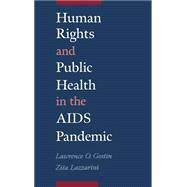- ISBN: 9780195114423 | 0195114426
- Cover: Hardcover
- Copyright: 4/10/1997
Historically, the disciplines of public health and human rights haveremained largely separate. The AIDS pandemic changed how we perceive the complexrelationship between human rights, public health and the communicable disease.Women and children, often lacking even basic human rights, are highly vulnerableto infection with HIV due to their inability to protect themselves in intimaterelationships, their sexuaal exploitation, and their lack of economic andeducational alternatives. Coercive government policies aimed at controlling theAIDS pandemic often infringe on the rights of individuals known or suspected ofhaving AIDS and decrease the effectiveness of public health measures. In manysettings protecting and promoting human rights becomes one of the key means ofprotecting individuals and groups from AIDS.We, as a society, have much to learn from the international response to AIDS; ithas changed our approach to public health problems and our perception of humanrights and their relationship to the health of people and populations. If we canintegrate these lessons into our AIDS policies, as well as our health care,social, economic, and political frameworks, we will be better prepared to detectand perhaps prevent the next pandemic of deadly disease.Gostin and Lazzarini have written a book that will be a valuable addition to thelibraries of public health professionals, policy makers, public-rightsactivists, medical law and nursing students, and informed generalreaders.






